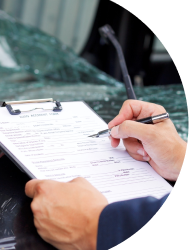After a car accident, especially one where you have been injured, the question of how to pay for the damage and incurred costs is an especially important one. Unfortunately, many people deny care at the scene of the crash out of fear of the exorbitant costs associated with American healthcare, but there is good news: if someone else caused your accident, we could help you recover the costs of your medical treatment (along with many other damages). However, this still does not answer the question of how your bills are paid in the short term following your crash. For this, we will need to take a closer look at your own insurance.

Car Accident Checklist
Download a copy of our FREE car accident checklist
Typically, your insurance will step in from the start and cover your medical bills. In an accident that you assume responsibility for, this is where the question ends, and you will need to address things like increased premiums, copayments, and meeting your deductible before your full coverage kicks in. For many, this can be financially devastating whether or not they have comprehensive health insurance.

How a Personal Injury Claim Works With Healthcare Costs
The following steps will give you a better idea of how many injury claims go in regards to medical treatment expenses; however, every accident is unique, and your situation deserves the attention of a dedicated legal professional who can help you identify the best path forward before guiding you through this complicated process. It is especially important to connect with an attorney IMMEDIATELY if you do not have health insurance that will cover your costs or if your insurer is pushing back on paying upfront while you seek compensatory damages from the at-fault party. You do not deserve to take on the financial impacts of someone else’s dangerous behavior.
Your Health Insurance Pays First
After an accident, your absolute top priority should be your medical needs. This means calling 911, getting examined by the responding EMTs, and following their advice if they think you should go to a hospital. If you are unconscious or unable to respond, they will make this decision for you. Too often, people refuse emergency medical care out of fear of massive healthcare expenses, but this refusal may actually give the other driver’s insurance company leverage for trying to downplay the severity of your injuries in an attempt to reduce their own financial obligation to you.
Regardless of whether or not you take an ambulance to the emergency room or are able to work directly with your own primary healthcare provider, the fact remains that your health insurance will go into effect in order to cover these initial costs, meaning that you will need to cover your deductibles, copayments, and all other gaps or exceptions to your coverage.
In some instances, particularly when contacted by a personal injury attorney representing your case, your insurance company may be willing to agree to payment accommodations that will help you as you wait for a settlement or award. Again, this is an important reason for working with an attorney who can help identify all possible avenues to alleviate your stress as you fight for the money you deserve.

Your Healthcare Provider Will Recover Their Costs From Your Personal Injury Claim
Your insurer will have first access to your final award or settlement in order to recover their own costs for your medical care. Typically, these costs make up a significant amount of the economic damages that a personal injury victim will receive in payment, either through a direct settlement or a lawsuit award. Regardless of how the money is repaid to you, your insurer will take what they are owed from the at-fault driver’s insurance company, which is liable for the cost of your injuries.
It is essential that you (or your attorney) gather all information and documentation from your own healthcare provider to ensure that you have accounted for every cost they will be seeking repayment for. It can be exceptionally frustrating for a victim to accept a settlement offer from the other insurance company only to realize that there is little or no money left over once their insurer has taken what they are legally entitled to. Insurance companies will work to settle claims against their policyholders for as little as possible, and it is not uncommon for victims to accept these low offers without realizing how much more they are owed until after the fact — when the waivers have been signed and they have no recourse for additional compensation.
The team at Fasig | Brooks is working on your behalf to ensure that you do not encounter this sort of surprise.
Your Attorney Takes Their Contingency Fee As Payment
Most personal injury attorneys, including the team at Fasig | Brooks, work on the basis of contingency fees instead of billing clients for the work performed upfront. This serves a few functions, most importantly the fact that it enables an injured victim to partner with experienced and aggressive personal injury representation without having to worry about paying out of pocket. With contingency fees, your attorney will collect a predetermined percentage of your final award as payment, and you will not pay if your attorney does not win your case.
In some minor accidents, you and an attorney may decide during an initial consultation that your possible compensation may not justify working with an attorney, but in many other cases, a victim may discover that they are entitled to far more than they had initially thought (or more than the insurance company had led them to believe). Even after the contingency fees are paid out, you may be surprised to discover that your final settlement is far more than the insurance company had offered at first.
You Collect The Remaining Damages
Once your insurer and your attorney have been paid out of your settlement, you will be able to collect the rest. These damages will address additional economic damages like lost wages, the cost of services you may have had to hire while recovering (driving, grocery shopping, house cleaning, etc.), and more. In addition to your economic damages, you may receive compensation for a range of non-economic damages such as the pain and suffering of your injuries, the emotional trauma of such a terrifying experience, and a variety of other damages that an experienced personal injury attorney can help you identify, calculate, and negotiate for.
Since you will be the final recipient of this compensation, it is exceptionally important that you work with a legal team who will fight for every dollar you are owed, whether through an out-of-court settlement or through a lawsuit in the courts. Typically, an attorney will first focus on reaching an agreement for a settlement amount without the courts, and in many cases, this is how the case is resolved. There are instances where it might actually make sense to take a case straight to the course, such as when there is a likelihood of a judge or jury awarded punitive damages, but these are rare and will require the experienced guidance of an attorney.
Hurt In An Accident? Contact Fasig | Brooks Today To Get The Legal Support You Deserve
If you have been hurt in an accident that someone else caused, working with a personal injury attorney is one of the best ways to ensure that you are able to collect the money that you deserve without having to take on the complex and stressful process on your own. Insurance companies and their agents are highly skilled at reaching low settlements in order to save as much money as possible, and these tactics are at the sole expense of the victim seeking compensatory damages for their involvement in an avoidable accident.
Contact our law firm as soon as possible to schedule a free consultation with an attorney so you can discuss the specifics of your situation. Knowing that there is a path forward towards the money you deserve — while being able to focus on your recovery without the added stress — can help you gain confidence in your future and work to get your life back on track.





